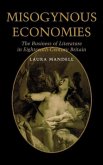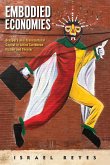Shakespeare's Domestic Economies Gender and Property in Early Modern England Natasha Korda "This is a truly excellent book on Shakespeare's treatment of domestic economies, that is, his attention to the domain of household management increasingly seen as the women's sphere in late sixteenth- and early seventeenth-century England."--Jean Howard, author of The Stage and Social Struggle in Early Modern England "This exceptional study makes an important and most welcome contribution."--Ben Jonson Journal "Korda draws on the best aspects of a variety of recent critical approaches while charting new territory of her own."--Choice Shakespeare's Domestic Economies explores representations of female subjectivity in Shakespearean drama from a refreshingly new perspective, situating The Taming of the Shrew, The Merry Wives of Windsor, Othello, and Measure for Measure in relation to early modern England's nascent consumer culture and competing conceptions of property. Drawing evidence from legal documents, economic treatises, domestic manuals, marriage sermons, household inventories, and wills to explore the realities and dramatic representations of women's domestic roles, Natasha Korda departs from traditional accounts of the commodification of women, which maintain that throughout history women have been "trafficked" as passive objects of exchange between men. In the early modern period, Korda demonstrates, as newly available market goods began to infiltrate households at every level of society, women emerged as never before as the "keepers" of household properties. With the rise of consumer culture, she contends, the housewife's managerial function assumed a new form, becoming increasingly centered around caring for the objects of everyday life--objects she was charged with keeping as if they were her own, in spite of the legal strictures governing women's property rights. Korda deftly shows how their positions in a complex and changing social formation allowed women to exert considerable control within the household domain, and in some areas to thwart the rule of fathers and husbands. Natasha Korda is Associate Professor of English and women's studies at Wesleyan University. 2002 288 pages 6 x 9 11 illus. ISBN 978-0-8122-3663-7 Cloth $59.95s £39.00 World Rights Literature, Women's/Gender Studies, Cultural Studies Short copy: A significant contribution to Shakespeare criticism that integrates feminism, materialist criticism, and legal history to offer an original look at how women's management of household goods became an important site of female struggle and resistance to England's patrilineal property regime. "Korda draws on the best aspects of a variety of recent critical approaches while charting new territory of her own."--Choice
Hinweis: Dieser Artikel kann nur an eine deutsche Lieferadresse ausgeliefert werden.
Hinweis: Dieser Artikel kann nur an eine deutsche Lieferadresse ausgeliefert werden.








